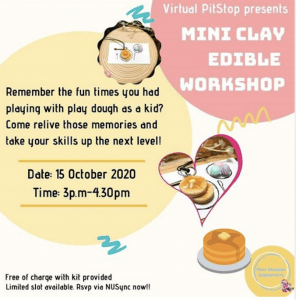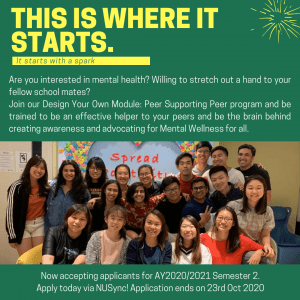Do you have the heart to serve others? Would you like to know how you can provide better emotional support to your peers, friends and family? If you’ve answered yes to both of these questions, being a Peer Student Supporter (PSS) might be just the job for you. Read on to find out how you can get involved as we speak to Li Wenbo, a PSS and Resident Assistant at PGPR on what his roles are, and how he has found his passion in supporting others.
1. Firstly, let’s get to know you! Can you introduce yourself and the roles you have taken on?
Hi, my name is Li Wenbo but most of my friends in PGP call me Bob. As an RA, the bulk of my work includes pastoral care and the planning and hosting of events. I took on this role as I am generally a very nurturing individual and like taking care of others. So, when I heard they were opening up slots for RAs, I immediately jumped at the opportunity.
My role as an RA also ties in with being a PSS as both jobs require me to be willing to care for others, and oftentimes put others needs above my own. However, I also feel that being a PSS has helped me better engage with my role as an RA as I’ve learnt how to better care for those around me.
2. What does it mean to be a PSS?
The PSS project was an initiative introduced by the Office of Student Affairs (OSA) where students can sign up to learn about mental wellness and attain skills to tackle mental health issues. It was originally founded as a module where students can attend regularly scheduled programs which discuss topics branching from depression, schizophrenia and even suicide prevention or intervention.
Classes are held at a venue called “Pitstop!” in YIH in NUS, which also functions as a venue for the fun, free workshops that we hold throughout the year, catered to the NUS student body.
Ultimately, the aim of this initiative is to not only provide a place for undergraduates to chill and hang out, but also a safe space for students to seek refuge if they are in need of a listening ear.
3. Is it easy for you to empathise with those who confide in you?
I think relating to my past experiences has helped me better understand those that I speak to. I’ve suffered from my own fair share of mental health issues, stemming from my unhealthy relationship with my body.
When I was younger, I used to be a lot more heavy set, which really took a toll on my self-esteem. I would just eat whatever I wanted and would feel ashamed when my peers commented about my weight. It was only in Secondary Three when my best friend and I hit a new record of 90kg on the same day that we both decided that something needed to be changed (Although looking back now, I do find that situation to be quite humorous).
Nowadays, I’m a lot more conscious of the measures I take to keep my body healthy and in shape. It took a lot of growing and understanding but I’ve finally come to a place where I’ve learnt to accept my body at whatever weight that it is at.
Similarly, I want to be able to help others overcome some of the issues that they face in their personal lives as well. I strongly believe that no one should face life’s adversities on their own and I want to be able to support others in their own journeys towards personal growth.
4. How is this different from other initiatives in NUS like the University Counselling Services (USC)?
After students graduate from the module, they are always welcome to join as part-time volunteers, to continue supporting their peers.
This means that most of the PSS volunteers are a lot closer in age to NUS students as compared to the counsellors at USC. The setting is a lot more informal, which is why some students prefer confiding in us. In a way, we are the bridge between the counsellors and the students as it can be daunting for most to take the first step in seeking professional help.
5. Do you feel like you’ve grown in any way after taking on this course?
Prior to taking this module, I found comforting someone in their time of need to be a very daunting task. The fear and pressure that I would feel would cause me to freeze up and not know what to say as thoughts like: ‘what if I say something wrong’ or ‘what if I can’t help them’, would pop up in my head.
However, we shouldn’t undermine the effects of just being there for someone and showing genuine empathy and concern. Looking back, I’ve also come to realise that it is more important to be observant and listen actively to what someone is telling you instead of rushing to solve the problem – because sometimes, the issue may not even call for a solution in the first place.
6. Do you have any tips that you have picked up along the way?
In my personal experience, I have had many friends who found it difficult to share about certain problems that they were dealing with, and would much rather open up to complete strangers. I used to not be able to understand their rationale and would feel frustrated whenever they refused to confide in me. Now, I’ve learnt to take a backseat and give them the space that they need. Some things are difficult to express and pressuring someone might sometimes make the situation even worse.
When that person eventually does decide to confide in you, you should not be fixated on solving the problem itself as you may end up forcing your perspectives or solutions onto them. Listen to their issues in its entirety and positively affirm them by telling them how resilient and strong they are. Adding on that their struggles are momentary can also be extremely encouraging.
Other tips include finding an anchoring topic to center around, and not introducing new information to the conversation. We should also be careful to refrain from directly quoting what that person is telling you.
These are lessons that may seem obvious when we first hear about them, yet often forget to utilize during actual times of crisis.
7. Has COVID-19 affected this initiative in any way?
Due to the pandemic, this initiative has had to be shifted online. However, we still run Virtual Pitstop sessions every Tuesdays and Thursdays, 1pm-5pm. Join us for a fun time with friends and if you need someone to talk to, don’t be afraid to approach us as well. We are always welcome to have you!
If you’re interested in becoming a PSS, recruitment is currently ongoing until the 23rd of October 2020. Click on the link to find out more and make a difference in your own way.






